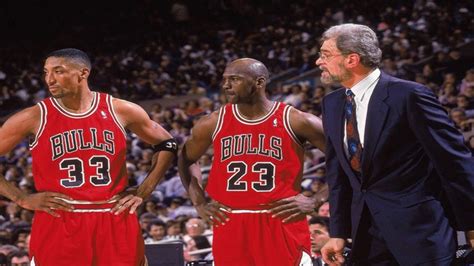
Phil Jackson, reflecting on Scottie Pippen’s often-overlooked contributions to the Chicago Bulls dynasty, asserts that Pippen’s exceptional play frequently left him in awe, emphasizing his critical role in the team’s success.
Former Chicago Bulls coach Phil Jackson has once again lauded Scottie Pippen’s profound impact on the Bulls’ dynasty, highlighting the often-underestimated nature of his contributions. Jackson, known for his Zen-like approach to coaching and his ability to manage superstar personalities like Michael Jordan and Dennis Rodman, recently reflected on Pippen’s exceptional all-around game, noting that his performances regularly elicited a sense of astonishment. “Scottie was just magnificent,” Jackson stated, emphasizing that Pippen’s versatility and basketball IQ were pivotal to the Bulls’ six NBA championships. Jackson’s comments serve as a reminder of Pippen’s critical, multifaceted role during one of basketball’s most dominant eras, challenging the narrative that often overshadows his accomplishments by focusing predominantly on Michael Jordan. The renewed appreciation for Pippen comes amid ongoing debates about the greatest teams and players in NBA history, as well as revisiting the dynamics within the legendary Bulls roster.
Jackson’s recent remarks underscore a broader effort to re-evaluate Pippen’s standing in basketball history. While Michael Jordan is universally recognized as the centerpiece of the Bulls’ dynasty, Jackson argues that Pippen’s contributions were indispensable. Pippen, often tasked with guarding the opponent’s best player, initiating the offense, and contributing as a scorer and rebounder, played a vital role in the Bulls’ success. “There were so many times when Scottie would make a play, defensively or offensively, that would just make you stop and stare,” Jackson said, highlighting the sheer talent and impact Pippen brought to the team. This perspective sheds light on the complexities of team dynamics and the importance of recognizing contributions that extend beyond scoring statistics.
The coach’s comments also subtly address the historical narrative, which often places Jordan at the forefront, sometimes at the expense of acknowledging Pippen’s significance. Jackson’s observations provide a counterpoint, emphasizing that Pippen was not merely a sidekick but a crucial component of the Bulls’ championship formula. This is particularly relevant in contemporary basketball discourse, where discussions about player rankings and team legacies frequently dominate sports media.
Further elaborating on Pippen’s specific contributions, Jackson pointed to his defensive prowess as a game-changer. Pippen’s ability to guard multiple positions effectively allowed the Bulls to implement complex defensive schemes that flustered opponents. His anticipation, agility, and length made him a formidable defender, capable of disrupting passing lanes, blocking shots, and containing some of the league’s most potent scorers.
Offensively, Pippen was more than just a scorer; he was a facilitator who possessed excellent court vision and passing skills. He often initiated the Bulls’ offense, making smart decisions and creating opportunities for his teammates. His ability to handle the ball, penetrate the defense, and make accurate passes made him a versatile offensive weapon.
Beyond the tangible statistics, Pippen brought an intangible quality to the Bulls: leadership. While Jordan was the team’s undisputed alpha, Pippen led by example, displaying unwavering commitment and a tireless work ethic. He set the tone for the team’s defensive intensity and inspired his teammates with his relentless effort.
The dynamic between Jackson, Jordan, and Pippen was a delicate balance of personalities and egos. Jackson’s coaching philosophy, rooted in Zen principles, emphasized mindfulness, teamwork, and selfless play. He fostered an environment where each player understood their role and contributed to the collective goal. Jackson’s ability to manage these star players and cultivate a cohesive team was a key factor in the Bulls’ success.
Moreover, Jackson’s recent comments come at a time when Pippen’s own legacy is being re-examined. Pippen has, in recent years, been more vocal about his career, his relationship with Jordan, and his perceived lack of recognition. His outspokenness has sparked debates about the fairness of his portrayal in media and the need for a more nuanced understanding of his contributions.
Jackson’s acknowledgement of Pippen’s greatness serves as a validation of his importance to the Bulls dynasty. It reinforces the idea that basketball is a team sport, and championships are won through the collective efforts of multiple players, each with their unique strengths and contributions.
The discussion around Pippen’s legacy also opens up a broader conversation about the criteria used to evaluate players and teams in basketball history. Scoring statistics often dominate the narrative, but Jackson’s comments highlight the importance of considering other factors, such as defense, playmaking, leadership, and overall impact on team success.
In conclusion, Phil Jackson’s recent reflections on Scottie Pippen’s greatness serve as a powerful reminder of the multifaceted contributions that Pippen brought to the Chicago Bulls dynasty. By emphasizing Pippen’s exceptional play and indispensable role, Jackson challenges the conventional narrative and encourages a more comprehensive appreciation of his place in basketball history. His remarks also underscore the importance of recognizing the diverse skill sets and intangible qualities that contribute to team success.
Expanded Analysis and Context:
To fully appreciate Jackson’s sentiment, it’s essential to understand the context of the Bulls dynasty and the specific challenges and triumphs they faced. The Bulls’ journey to dominance was not a straightforward one. They endured years of playoff disappointments before finally breaking through in 1991.
The initial struggles forced the team to evolve. Pippen, drafted in 1987, grew from a raw talent into a versatile star under Jackson’s guidance. Jackson implemented the “triangle offense,” a system that emphasized ball movement, player spacing, and decision-making. This system required players to be versatile and intelligent, qualities that Pippen possessed in abundance.
Pippen’s defensive versatility was particularly crucial in the Bulls’ battles against their rivals. He often guarded players like Magic Johnson, Larry Bird, and Clyde Drexler, demonstrating his ability to adapt to different styles of play. His defensive efforts were often overlooked in favor of Jordan’s scoring exploits, but Jackson consistently recognized their importance.
The Bulls’ success also hinged on their ability to overcome internal challenges. The relationship between Jordan and Pippen was complex, marked by both mutual respect and occasional tension. Jordan’s competitive intensity sometimes clashed with Pippen’s more laid-back demeanor. However, Jackson skillfully navigated these dynamics, fostering a sense of unity and shared purpose.
The “Last Dance” documentary, which chronicled the Bulls’ 1997-98 season, reignited the debate about Pippen’s role in the dynasty. While the documentary celebrated Jordan’s greatness, it also highlighted some of the challenges and frustrations that Pippen faced during his time with the Bulls.
Pippen himself has been critical of the documentary, feeling that it unfairly portrayed him and minimized his contributions. He has argued that he was underpaid throughout his career and that he did not receive the recognition he deserved.
Jackson’s recent comments can be seen as a response to these criticisms, a way of reaffirming Pippen’s value and celebrating his accomplishments. By emphasizing Pippen’s exceptional play and indispensable role, Jackson provides a more balanced and nuanced perspective on the Bulls dynasty.
The enduring legacy of the Bulls dynasty continues to fascinate basketball fans and historians. Their dominance in the 1990s set a new standard for team excellence, and their impact on the game is still felt today.
The debate about player rankings and team legacies is a constant feature of sports discourse. While individual statistics and accolades are important, Jackson’s comments remind us that true greatness is often measured by a player’s ability to contribute to team success, both on and off the court.
Impact on Contemporary Basketball:
The lessons learned from the Bulls dynasty are still relevant in contemporary basketball. Teams that prioritize teamwork, versatility, and defensive intensity are often the most successful. The emphasis on player empowerment and individual expression in today’s NBA has sometimes overshadowed the importance of collective effort.
Jackson’s comments serve as a reminder that basketball is ultimately a team sport, and that championships are won through the combined efforts of multiple players. The ability to manage diverse personalities and cultivate a cohesive team remains a crucial skill for coaches.
The legacy of the Bulls dynasty also provides a valuable historical context for understanding the evolution of the game. Their innovative offensive and defensive strategies influenced subsequent generations of players and coaches. The “triangle offense,” in particular, remains a popular system at all levels of basketball.
Further Reflections on Pippen’s Versatility:
Scottie Pippen’s versatility was genuinely groundbreaking for his era. In a league where players were often pigeonholed into specific roles, Pippen defied categorization. He could handle the ball like a point guard, defend all five positions, score from anywhere on the court, and rebound with tenacity.
His ability to guard multiple positions was particularly valuable in an era when matchups were more fluid and less pre-determined. He could switch onto smaller, quicker guards or bang with bigger, stronger forwards without losing effectiveness. This versatility allowed the Bulls to be incredibly adaptable on defense.
Offensively, Pippen was a master of the “point forward” role, initiating the offense and making plays for his teammates. His court vision and passing skills were exceptional, and he consistently made smart decisions with the ball. He was also a capable scorer, capable of creating his own shot or finishing in transition.
Pippen’s versatility extended beyond his physical skills. He was also a highly intelligent player who understood the nuances of the game. He had a keen sense of timing and anticipation, which allowed him to make timely steals, blocks, and rebounds.
His all-around game was a perfect complement to Jordan’s scoring prowess. While Jordan was the primary offensive weapon, Pippen provided the support, playmaking, and defensive intensity that allowed the Bulls to thrive.
The Role of Team Chemistry:
The Chicago Bulls’ success was not solely due to the individual brilliance of Jordan and Pippen. The team also possessed a strong sense of chemistry and cohesion. Players like Horace Grant, Dennis Rodman, and Toni Kukoc all played crucial roles in the Bulls’ championship runs.
Jackson’s coaching philosophy emphasized teamwork, selflessness, and mutual respect. He created an environment where players felt valued and empowered, regardless of their individual roles. This fostered a strong sense of camaraderie and shared purpose.
The Bulls’ chemistry was evident in their on-court play. They moved the ball well, defended as a unit, and consistently made the extra pass. Their ability to trust and rely on each other was a key factor in their success.
The “Last Dance” documentary provided a glimpse into the inner workings of the Bulls’ locker room. While the documentary highlighted some of the tensions and conflicts within the team, it also showcased the strong bonds that existed between the players.
The importance of team chemistry is often overlooked in contemporary basketball, where individual statistics and accolades tend to dominate the narrative. However, the Bulls’ dynasty serves as a reminder that a cohesive and well-balanced team is often more successful than a collection of individual stars.
Addressing the Underpayment Issue:
One of the recurring themes in the discussion about Scottie Pippen’s career is the issue of his underpayment. Pippen was famously underpaid throughout much of his time with the Bulls, due to a long-term contract he signed in 1991.
At the time, Pippen was seeking financial security for himself and his family. However, the contract proved to be a significant financial disadvantage as his value skyrocketed along with his performance and the Bulls’ success. His salary lagged far behind those of other top players in the league.
This underpayment became a source of frustration for Pippen, who felt that he was not being adequately compensated for his contributions to the Bulls’ dynasty. He has spoken openly about his resentment towards the Bulls’ management and his feeling of being undervalued.
The issue of Pippen’s underpayment highlights the complexities of contract negotiations in professional sports. Players often face difficult decisions when balancing financial security with their market value.
The current NBA landscape, with its emphasis on player empowerment and free agency, has made it easier for players to negotiate more lucrative contracts. However, the issue of underpayment remains a concern for some players, particularly those who sign long-term deals early in their careers.
Frequently Asked Questions (FAQ):
1. What was Phil Jackson’s main point about Scottie Pippen’s contributions to the Chicago Bulls?
Phil Jackson emphasized that Scottie Pippen’s exceptional play and all-around contributions were often overlooked, and that his performances regularly left Jackson in awe. He highlighted Pippen’s versatility, defensive prowess, playmaking ability, and leadership as indispensable to the Bulls’ success.
2. How did Pippen’s defensive versatility impact the Bulls’ strategy?
Pippen’s ability to guard multiple positions effectively allowed the Bulls to implement complex defensive schemes that disrupted opponents. His anticipation, agility, and length made him a formidable defender, capable of containing some of the league’s most potent scorers.
3. What was Pippen’s role in the Bulls’ offense beyond scoring?
Pippen was a facilitator who possessed excellent court vision and passing skills. He often initiated the Bulls’ offense, making smart decisions and creating opportunities for his teammates. His ability to handle the ball, penetrate the defense, and make accurate passes made him a versatile offensive weapon.
4. How did Phil Jackson manage the complex dynamics between Jordan and Pippen?
Jackson’s coaching philosophy, rooted in Zen principles, emphasized mindfulness, teamwork, and selfless play. He fostered an environment where each player understood their role and contributed to the collective goal. Jackson’s ability to manage these star players and cultivate a cohesive team was a key factor in the Bulls’ success.
5. What is the context of the recent re-examination of Pippen’s legacy?
The discussion around Pippen’s legacy is being re-examined, with Pippen himself being more vocal about his career, his relationship with Jordan, and his perceived lack of recognition. This has sparked debates about the fairness of his portrayal in media and the need for a more nuanced understanding of his contributions. His outspokenness has sparked debates about the fairness of his portrayal in media and the need for a more nuanced understanding of his contributions, as well as the issues related to him being drastically underpaid during the peak of his career.









